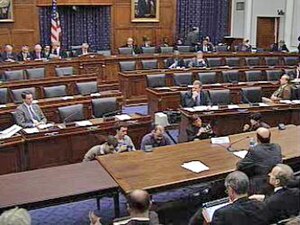| Ben Bernanke (lower-right), Chairman of the Federal Reserve Board of Governors, at a House Financial Services Committee hearing on February 10, 2009. (Photo credit: Wikipedia) |
“Keep putting these difficult decisions will only prolong and intensify the uncertainties,” said the head of the U.S. central bank during a conference organized by the Economic Club of New York, the first offering from the re-election of Barack Obama as U.S. president. Bernanke added that “a credible framework” is “urgently needed to ensure economic growth and stability in the long term.”
In this regard, called on Congress and the Obama Administration to “protect the economy from the impact of severe adjustment” which involves “tax precipice”, a combination of tax increases and massive spending cuts that take effect in January if not reach an agreement to reduce the deficit in the long term. These automatic measurements of at least 500,000 million next year alone, pose a “substantial threat” to the U.S. economic recovery, as a “fiscal shock that size would lead the economy to fall back into the recession. ”
Bernanke referred also to the need for Washington to adopt in 2013 a further increase of the country’s debt ceiling “to avoid the possibility of a catastrophic bankruptcy”, a scenario that already came close in the summer of 2011 and and then “heavily damaged confidence, even having reached an agreement.” In his view, if the United States again faced with this situation, “this time could mean financial and economic costs even higher” then, when the result was inter alia the first reduction of the maximum rating of the country’s debt, undertaken by Standard & Poor’s.
“Joining to find fiscal solutions will not be easy, but much is at stake,” said Bernanke, who warned that the uncertainty of the “tax cliff” “already affecting private spending and investment decisions, and can be contributing to a sense of caution in the financial markets. ” In his appearance, Bernanke also talked about other “headwinds” that have been holding back the recovery in the U.S., including “financial and fiscal situation in Europe”, but acknowledged that European leaders “have made great strides recently.”
In particular he referred to the new program of the European Central Bank (ECB) to buy unlimited sovereign bonds of euro countries with difficulty, conditional on the governments concerned to seek help temporary rescue fund (EFSF) or permanent (ESM). With respect to U.S. monetary policy, Bernanke announced no new measures or suggested expansive beyond those already implemented by the Fed: monthly purchase of 40,000 million dollars in mortgage securities and redemption of 45,000 million monthly Treasuries short term by other long.
He reiterated that while monetary policy has helped the U.S. recovery, “it is by no means a panacea for our economic problems” and “does not have the tools” to counter the possible effects of “fiscal cliff.” Despite qualifying the pace of recovery in the U.S. economy “a disappointing slow,” Bernanke said that inflation has remained moderate and that the housing market “has shown some clear signs of improvement since home sales, prices and construction have risen since early this year. “ ...


No comments:
Post a Comment